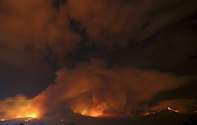
Kruger Park News Archive
Geographers from the University of Leicester are to use state-of-the-art technology to investigate how climate change is affecting the Kruger National Park (KNP). It is part of a wider project examining the impact of climate change on African savannas.
The academics in the department of geography at the University of Leicester have been awarded Royal Society funding to establish a science network with South Africa. Professor Heiko Balzter and colleagues are going to work with leading South African researchers from the Council for Scientific and Industrial Research (CSIR). The partnership has the title 'Land surface / atmosphere interactions in African savanna ecosystems.
'Professor Balzter said: 'The partnership will measure South African savanna properties and develop computer models that can be used to understand climate change impacts on these ecosystems. 'The funding will enable a team from Leicester to visit South Africa in 2009 for a workshop at Skukuza in the Kruger National Park. The sites in the Kruger Park have been used for decades for controlled burning experiments, and more recently for measuring carbon dioxide exchanges between land and atmosphere. The workshop will include time for networking activities, field techniques training, knowledge exchange and developing plans for research funding bids.
'The network will expand a previous collaboration with CSIR in the European CarboAfrica project. This project is developing a prototype carbon accounting system by integrating eddy covariance flux towers, remote sensing, modelling and GIS techniques.
The South-Africa / UK Science Network funding will allow a more strategic and long-term institutional collaboration include early-career academic and research staff in both institutions by facilitating a face- to-face meeting and enabling joint funding initiatives. The network aims to develop research collaboration in the field of land/atmosphere interactions, deploying biogeochemical and physical field measurements to parameterise land surface models and satellite remote sensing data to upscale from plot to regional scale. The participants have expertise in land surface modelling, eddy covariance techniques, remote sensing, fire research and atmospheric chemistry. Both teams have track records of winning competitive research grants from NRF, NERC and the EU.
Dr Scholes from the CSIR said ' The savannas of the world are one of the few land ecosystems that have both the extent and dynamic variability to make a big impact on the global climate. In the process, they will change in ways that affect their ability to support biodiversity. We need to know how they may behave in the future.
'Professor Balzter added 'I am very pleased that the Royal Society is supporting this fundamentally important research collaboration between a leading geography department from Britain and a recognised centre of excellence in South Africa.
The issue of savanna fires and how they interact with climate change is a hot topic. The latest IPCC scenarios suggest that June to August rainfall in South Africa could drop by as much as 20 percent over the next decades. Together with rising temperatures this change could drastically alter the savannah and consequently the living conditions of wildlife in the park."

